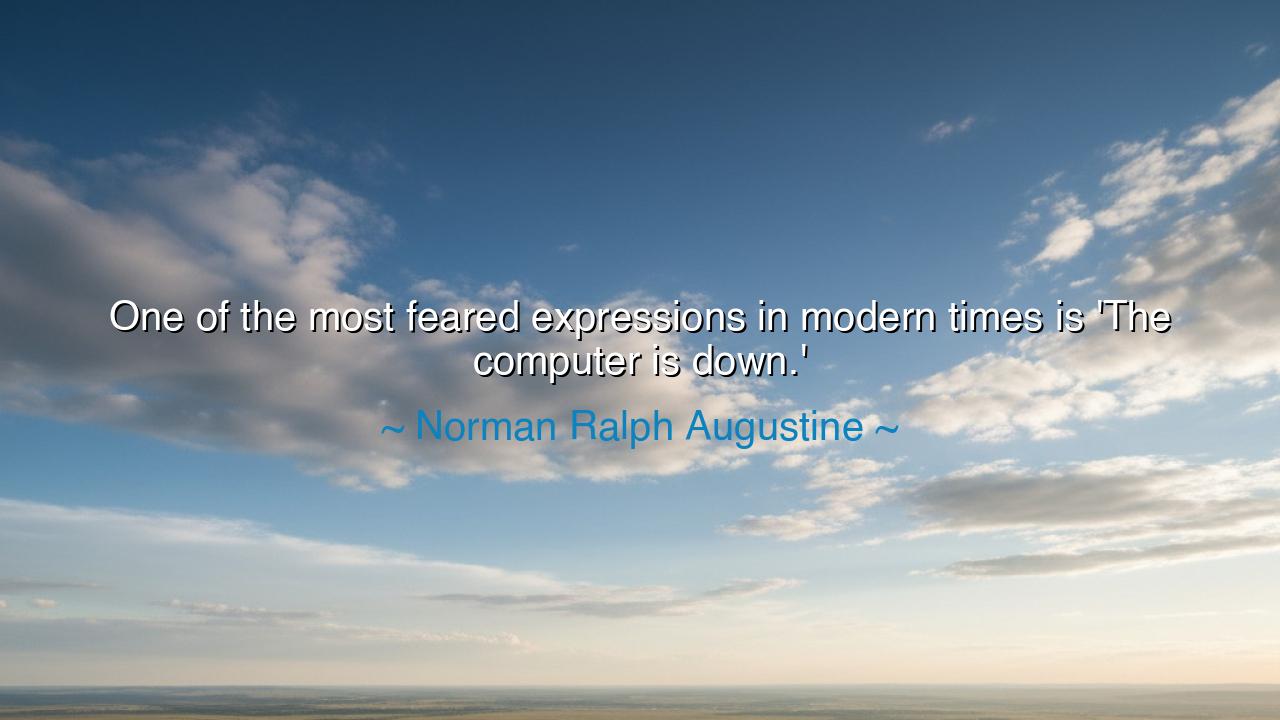
One of the most feared expressions in modern times is 'The






In the fast-paced world of modern life, there exists a moment of palpable fear—a moment where the hum of progress halts, and the promise of technology seems fragile and uncertain. Norman Ralph Augustine captures this fear with his words, "One of the most feared expressions in modern times is 'The computer is down.'" In this simple statement, Augustine not only highlights the dependence we have on technology but the profound shift that has taken place in the human experience. What was once a tool—an auxiliary aid to human labor—has now become the lifeblood of our daily existence. Without it, the modern world appears to grind to a halt. Augustine's words, while brief, encapsulate a deeper truth: our lives are now intertwined with machines to such an extent that their failure leaves us vulnerable, exposed, and, for many, paralyzed.
The ancient Greeks were keenly aware of the power of tools, but more so of the consequences of losing them. Homer, in his epic tales, often described heroes who, despite their great strengths, were only as powerful as the weapons they wielded. Achilles, the greatest of the Greek warriors, was invincible only with his divine armor, and when that armor was lost, so too was his strength. In much the same way, we have come to rely on the computer as our modern armor, protecting us, guiding us, and enabling us to perform tasks that were once unimaginable. To say "The computer is down" is to acknowledge that the very tool upon which our modern strength depends has failed us, leaving us vulnerable in a way we have not felt in centuries.
Consider the Industrial Revolution, when society’s reliance on machines first began to reshape daily life. The great factories of England and America were powered by steam engines, and the disruption of these machines could bring entire industries to their knees. A broken engine, a halted production line, was a cause for panic because it threatened not just the factory, but the livelihood of countless workers and the stability of the community itself. In much the same way, today’s computers have become the engines of our modern factories—our homes, businesses, and personal lives all depend on their steady operation. When the computer is down, the machinery of the modern world halts, and we feel a similar panic.
In the 20th century, the telephone transformed society just as dramatically, allowing instantaneous communication over long distances. Yet, even in that era, the telephone was considered a luxury in some parts of the world, and its failure didn’t cause the same widespread fear as the computer does today. Phones were important tools for connection, but their absence didn't bring civilization to a standstill. In contrast, the computer is no longer just a tool; it is the foundation upon which our social, economic, and intellectual lives rest. Social media, commerce, healthcare, education, and even our most basic communications rely on these machines, making the failure of a computer not just inconvenient but catastrophic.
Augustine's statement also reflects a deeper truth about human nature and our relationship with technology. As we have become more dependent on computers, we have also given up more control over the things that once required human effort and judgment. The ancient Romans had their own relationship with technology, often marveling at their aqueducts and roads, which represented the height of human achievement. But in their day, the failure of a road or water supply might inconvenience, but not cripple, a society. Today, the collapse of the computer—whether it be in a bank, a hospital, or a simple household—reaches deeper, affecting not only practical tasks but personal identities and social bonds. Our reliance has become so profound that a breakdown in this system strikes at the core of our existence, making us feel helpless in a way the ancients never knew.
The lesson in Augustine’s words is a reminder of the power and fragility of technology in our lives. In a world where the computer is the central cog in nearly every aspect of our existence, we must understand that while these tools empower us, they also leave us vulnerable. This dependency on technology, though it has brought great advancements, also carries the weight of responsibility. We must not allow ourselves to be consumed entirely by the very systems we create. The real lesson is not just about the fear of a broken computer, but about maintaining our ability to function, to adapt, and to thrive even in the face of technological breakdowns.
In practical terms, this means we must build not only systems that work but systems that are resilient, systems that offer us options beyond the machine. Education, critical thinking, and community are essential in a world where technology could fail us at any moment. We must not allow ourselves to become so reliant on one system, whether it be a computer or a social network, that we lose our ability to operate without it. Let us remember the wisdom of the ancients, who understood the importance of balance—between the reliance on tools and the strength to stand independent of them. As we move forward, let us create systems that not only empower but also protect our humanity, ensuring that when the computer is down, we will not fall into chaos but rise to meet the challenge.






AAdministratorAdministrator
Welcome, honored guests. Please leave a comment, we will respond soon